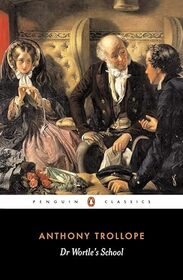
I think Trollope is just showing off. Apparently, he wrote Dr Wortle’s School (1881) in just three weeks. Admittedly, it’s a fairly slim volume, but even so, he’s still a pesky overachiever. The eponymous Doctor runs a successful private school and enjoys a good reputation in the fictional county of Broughtonshire. His life is severely disrupted, however, by the arrival of a new schoolmaster, Mr Peacocke, and his beautiful American wife. Although outwardly a perfectly respectable, yet enigmatic, couple, the appearance of a stranger at the school gates heralds the revelation that Mrs Peacocke is a bigamist. Now, I’m not spoiling anything here, as Trollope ruins this plot element himself in the opening pages. He wanted to avoid the plot-driven style of the sensation novel and instead focus on the psychological drama.
There are mitigating circumstances surrounding the bigamous union: Mrs Peacocke believed her violent and alcoholic husband to be dead when she remarried. However, the good people of Broughtonshire are scandalised and Dr Wortle is placed in an iniquitous position. His character is reminiscent of the Vicar of Bullhampton, who has to navigate complex issues within the context of the moral absolutes dictated by Christian teaching. He counters the prevailing bigotry with his own policy of empathy and forgiveness.
The illuminating introduction by Mick Imlah suggests that Trollope based Dr Wortle on himself, and that the character of Mrs Peacocke was inspired by the Bostonian Kate Field, for whom he felt a deep affection (and possibly more). His portrayal of the unfortunate bigamist is deeply affecting. She is shown to be unremittingly good in order to avoid the reader’s censure, but without ever becoming dull, and is always poised and dignified in the face of prejudice. She resists the temptation to tell her antagonists that their hardness is as bad as her supposed impurity.
Trollope enjoyed exploring the narrative possibilities of bigamy. In the earlier John Caldigate (1879) he addressed the issue of whether a man is entitled to a sexual past, where a seemingly unblemished bridegroom is accused of having contracted an earlier imprudent marriage. This departure, to me at least, marks a slight erosion of the double standard which held a woman’s impropriety to be a far more serious matter than that of a man. Although many critics believe the sensation novel had died out by the end of the 1860s, Trollope was successfully perpetuating the genre until the 1880s, although imbuing it with more moral complexity and a greater depth of character.
Dr Wortle’s School by Anthony Trollope. Edited by Mick Imlah.